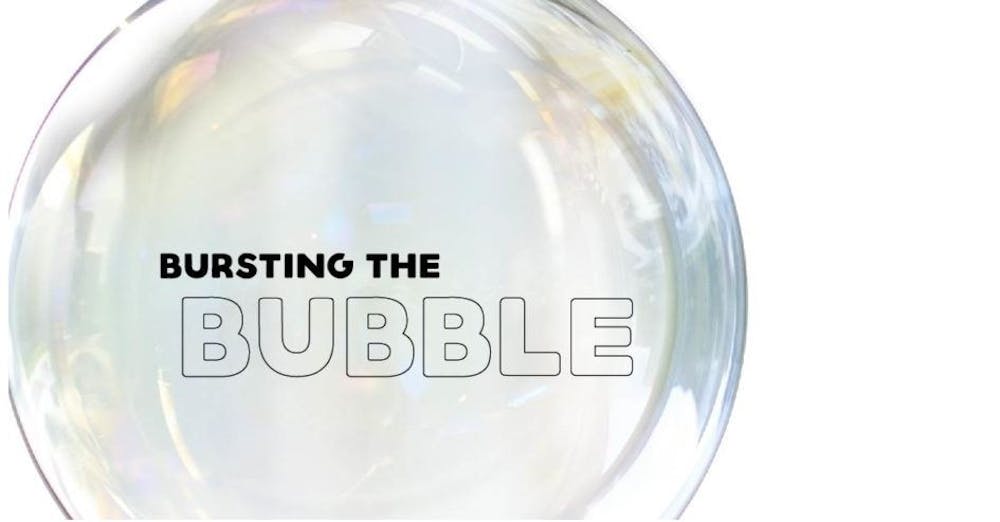“Let’s Get Wasted When She Wins,” Hannah Schneider typed as the title for her Facebook event on November 8, 2016.
Hannah and her friends would gather in Brother’s to drink their Long Island pitchers and celebrate Hillary Clinton becoming the 45th President of the United States. Because that’s what everyone Hannah knew predicted. But it didn’t happen.
Hannah invited thirty people to her event and meticulously ensured they were Hillary supporters, or at least not in favor of Donald Trump. She chose a local Muncie bar and restaurant called Brother’s as their meeting spot. She created a meme of Clinton on Facebook, placing the words “Frick Yeah Baby!!!” over photos of the candidate. At this point, she was almost making a joke of it, she says. There was no way Clinton would lose.
The group laughed and clinked their glasses together as they watched the electoral votes trickle in on election night. There seemed to be a split among the people in the bar. As her side cheered, the other side would sit in silence, and vice versa.
The Facebook event page became a place for the people Hannah invited to spread positivity regarding the election. Throughout the night, they would post about Clinton “having it in the bag.”
But as the Electoral College votes came in, Trump took Ohio. Then he took Florida. Suddenly everything Hannah and her guests knew didn’t seem to add up. There were cheers for Trump all around them. The drinks were gone, and the atmosphere had shifted.
Some in Hannah’s group began to leave the bar, not wanting to be surrounded by those rejoicing as Trump pulled ahead. The Facebook group’s tone also changed as members began messaging frantically, “Guys, I’m really scared… Is anyone still up?”
To Hannah’s dismay, Donald Trump became the 45th President of the United States.
Hannah had been living in an echo chamber. An echo chamber, or a filter bubble, is a space in which one’s biases and behaviors are reinforced by limited access to opposing viewpoints. If someone who identified as liberal only read liberal editorials, for example, the ideas in those articles would only confirm what the reader already believes. Kristen McCauliff, an associate communication studies professor at Ball State University, says people in echo chambers surround themselves with information that tends to confirm their attitudes and opinions.
While comfortable and convenient, echo chambers can be problematic. They can confirm biases, attitudes, behaviors, and “facts” that aren’t necessarily true.
“Humans tend to feel more comfortable in these circles of like-minded people because humans avoid cognitive dissonance,” McCauliff says.
Leon Festinger first proposed the theory of cognitive dissonance in his 1957 book, A Theory of Cognitive Dissonance. Festinger compares cognitive dissonance, a feeling of inconsistency, to the feeling of hunger. Humans sense the inconsistency and need to address it, just as they need to eat when they’re hungry.
McCauliff says that uncomfortable feeling could explain why a smoker might avoid reading about the negative effects of smoking. It also might lead someone who just purchased a car to search for reviews confirming that the car was a good purchase.
Hannah didn’t realize she was in an echo chamber. Those in an echo chamber usually don’t intentionally limit the information they see. For example, Facebook will suggest articles similar to ones a user has been frequenting.
Justin Reich, executive director of the Teaching Systems Lab at MIT’s Office of Digital Learning, says some echo chambers are created for users by algorithms on media platforms. If people don’t intentionally seek stories other than the ones suggested to them, they might think everyone shares those opinions and ideas—not that they are only seeing what confirms their beliefs.
Rebecca VanMeter, a professor of marketing at Ball State University, says algorithms are great for businesses. By understanding a consumer’s location and habits, businesses can better market their products. But VanMeter doesn’t necessarily think that’s a good thing. She says it’s an invasion of privacy that often scares her. One morning, for example, a pair of boots she had searched for on her phone appeared in an ad next to her Facebook feed on her computer.
Social media can also help politicians reach the public. Rather than paying for advertising, social media users can campaign for their candidates online. Clinton spent $79.1 million more on advertising than Trump did during the race, but social media helped Trump win for free. He could tweet, get media coverage about his tweet, and have his followers retweet him.
Social media algorithms and the bubbles they create can contribute to unhealthy perceptions of the world, McCauliff says. People in the comfort of familiarity don’t encounter attitudes or behaviors that challenge their own.
McCauliff was surprised by the election results, but she spoke with a progressive friend who wasn’t. That friend had listened to conservative news radio during the campaign, so she understood that Trump had more supporters than many people thought.
Echo chambers can threaten democracy by creating different sets of “facts,” McCauliff says. For example, according to a 2016 Gallup poll, only 40 percent of Republicans worry about global warming compared to 84 percent of Democrats.
This is why Reich, from MIT’s Office of Digital Learning, believes echo chambers are a problem. If people on both sides of the political spectrum overlook facts and refuse to discuss social issues with civility, healthy debates will cease to exist. “Democracy relies on interaction between those with opposing viewpoints,” he says.
People need to balance stepping in and out of their echo chamber communities, McCauliff says. She makes an effort in her own life to reach out to people with political beliefs that challenge her own. She wants to understand why she didn’t foresee Trump’s victory.
Reich says there are two theories about information on the Internet. The first: The Internet is a place for engaging in conversation with those different from us. The second: The Internet can enable bubbles in which individuals only engage with people they choose.
As months have passed, Hannah says she can now understand why she found herself in an echo chamber. But she still doesn’t agree with the election of Donald Trump, and she finds comfort in those who share this opinion.
Escaping an echo chamber is difficult. It requires a change of habits and a conscious effort to hear opposing views.
McCauliff says she might consider listening to conservative radio in the car ride home, just as her friend does. Even as she teaches students about their echo chambers, this election forced her to reevaluate her own.





